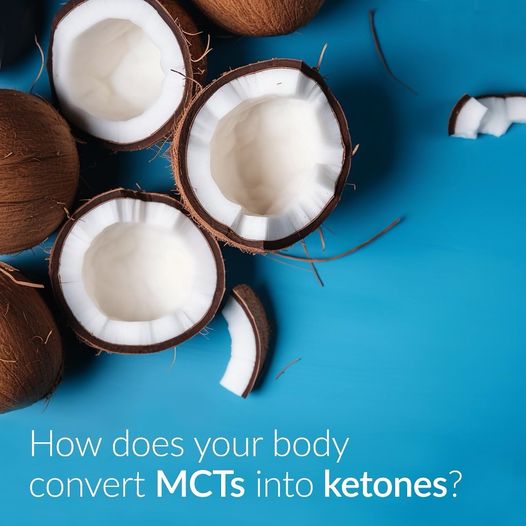Did you know that consuming medium chain triglyceride oil can induce a mild state of nutritional ketosis without the need to reduce dietary carbohydrate?Have you ever wondered why?
Medium-chain triglycerides (MCTs) are a type of dietary fat that differ from other fats such as short- or long-chain triglycerides in terms of their structure and metabolism. When consumed, MCTs undergo a unique process in the body, which ultimately leads to the production of ketones.
Due to their length, MCTs are rapidly absorbed in the small intestine and transported directly to the liver via the portal vein. Once in the liver, MCTs are broken down through a process called beta-oxidation. Enzymes in the liver convert MCTs into medium-chain fatty acids (MCFA), primarily in the form of octanoic acid (C8) and decanoic acid (C10).
The next step of their metabolism involves the conversion of MCFA into ketones. This process occurs in the liver’s mitochondria, where MCFA undergo beta-oxidation, producing acetyl-CoA molecules. Unlike long-chain fatty acids, which require a carnitine shuttle to enter the mitochondria, MCFA can freely cross the mitochondrial membrane.
Once inside, the rapid influx of MCFA-derived acetyl-CoA molecules overwhelm the flow of metabolites able to combine with oxaloacetate and enter the Kreb’s Cycle, causing the excess to be shunted towards the ketogenesis pathways. This results in the production of the ketone bodies beta-hydroxybutyrate (BHB) and acetoacetate (AcAc) which are shipped from the liver and circulate in the bloodstream, where they are taken up by extrahepatic tissues. Notably, the brain is a particularly avid ketone-user that will rapidly and efficiently take up and metabolize ketones at a rate relative to their concentration in the blood.
Because of these unique properties of MCTs, scientists believe that their supplementation may provide therapeutic benefits of ketosis in a variety health conditions, especially those characterized by impaired glucose metabolism, such as mild cognitive impairment or Alzheimer’s disease.
![]()




